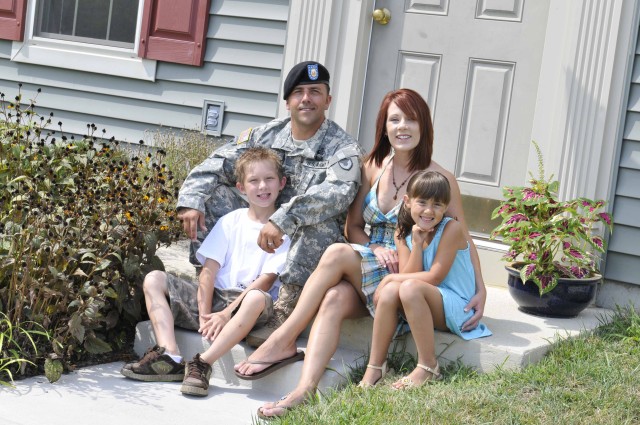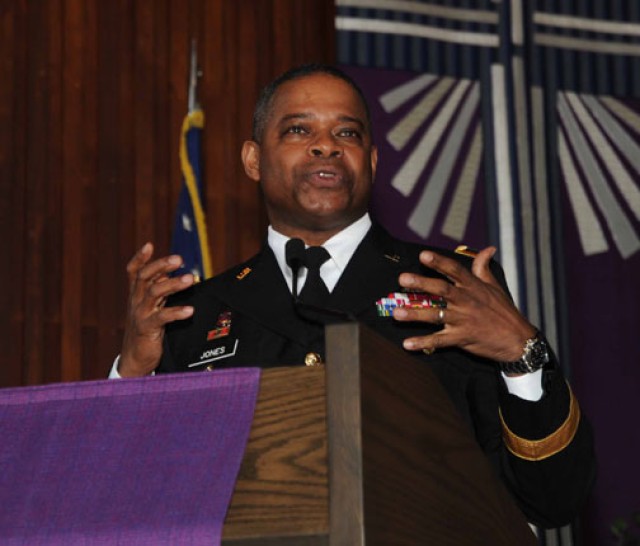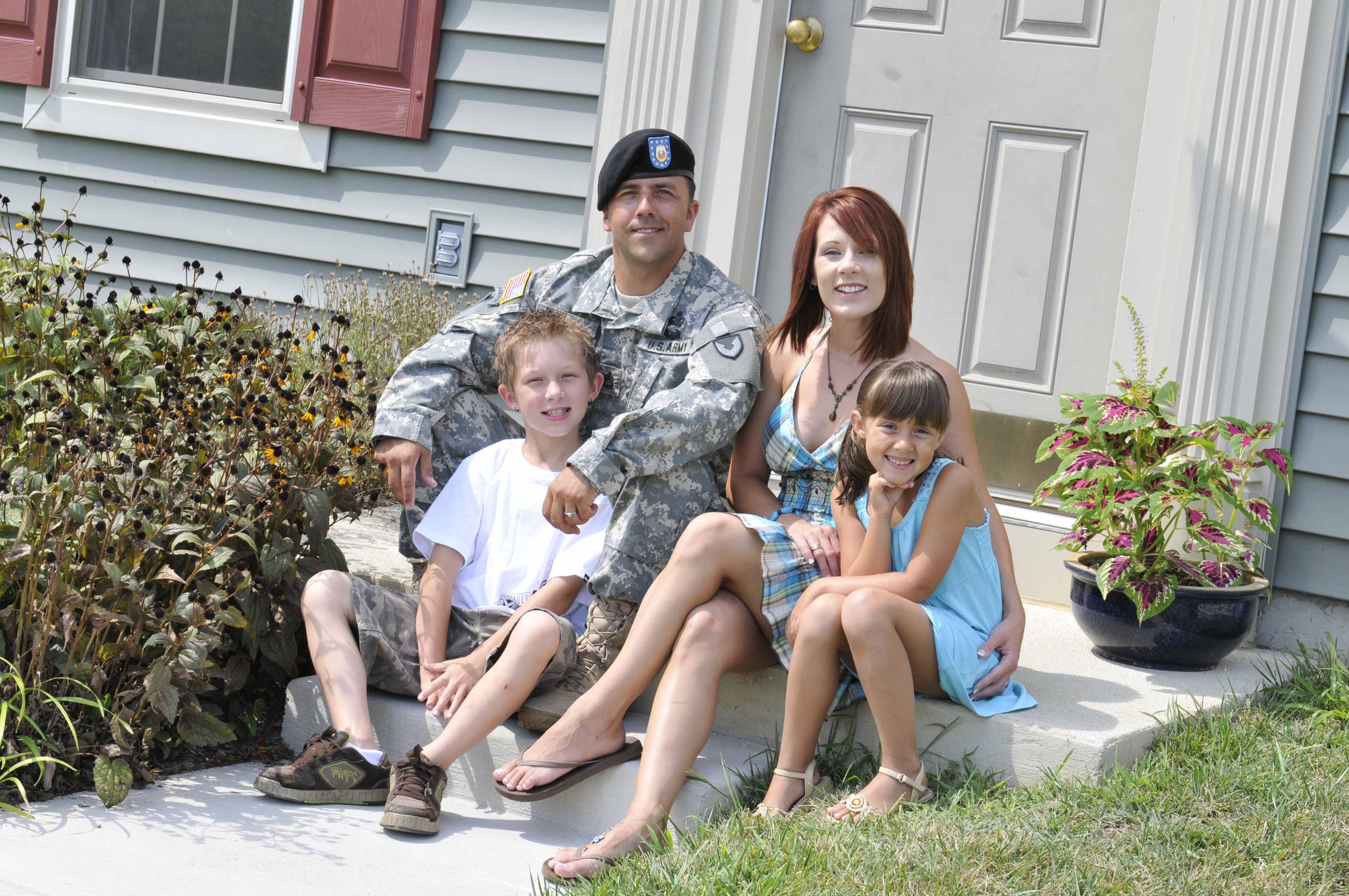IN an era of persistent conflict, our Army Families are called upon to endure many hardships and are no less critical to mission success than our Soldiers. Repeated deployments and extended separations place a severe strain on our Families, which in turn affects combat readiness, as well as enlistment and retention efforts.
Lieutenant Gen. Rick Lynch, the commanding general of Installation Management Command and assistant chief of staff for Installation Management, summed it up succinctly when he said: "Our Army is not going to break because of our Soldiers...but it might break because of the stress we're placing on their Families."
Through research such as the Family and Morale, Welfare and Recreation Command's semi-annual Survey of Army Families, we know that quality of life for Families is an integral part of a Soldier's decision to reenlist. By 2007, when the Army Family Covenant was unveiled, it was clear that quality of life was also integral to the Army's ability to deploy.
A Soldier in a fighting position needs to be facing forward, concentrating on the mission, not distracted by Family concerns. The Covenant ensures that Soldiers can find the resources they need, when they need them, and that they have the tools to remain self-reliant. When Families are self-reliant and have access to appropriate support systems, our Soldiers are better able to concentrate on their missions.
Lieutenant Gen. Jack Stultz Jr., Army Reserve chief and commanding general, U.S. Army Reserve Command, said, "To be successful as a military we need four things: a Soldier, that Soldier's Family, the Soldier's employer, and a supportive community."
I couldn't agree with him more and the Army Family Covenant covers all four.
"Never before in the history of our Army have we asked so much of our Families," said Gen. George W. Casey Jr., chief of staff of the Army. "They are serving side-by-side with our Soldiers, enduring their hardships, providing the unconditional love and support that truly make our Army strong."
The Covenant is built upon five core commitments from Army leadership to:
- Standardize and fund Family programs and services.
- Increase accessibility and quality of health care.
- Improve Soldier and Family housing.
- Ensure excellence in child, youth and school services.
- Expand education and employment opportunities for Family members.
Now in its fourth year, the AFC commitment is enduring. Support has extended all the way to the White House. "The readiness of our armed forces depends on the readiness of our military Families," First Lady Michelle Obama said.
To ensure that readiness, the Army has doubled its investment in core Family support programs, and Casey has pledged continued support to this investment, saying: "The Army Family Covenant is one of the programs that we will continue to put the right amount of funding into so that Family Programs can provide for all Soldiers and their Families."
The Army Family Covenant is enabling us to reach that potential.
While the Army has made significant and measurable progress in improving Family programs, health care, housing, child and youth services, recreation, education and employment opportunities, there is still work to be done to build an environment where Army Families can prosper and realize their full potential.
Looking ahead, the covenant will continue the Army's dedication to sustain and partner with Soldiers and their Families in order to build an environment where they can prosper and realize their potential-all essential in sustaining an all-volunteer force.
The Army Family Covenant: A look at the numbers:
SIGNIFICANT accomplishments in improving Soldier and Family readiness and well-being over the past four years include:
- Closed chronic Army Community Service staffing gaps by creating 477 new ACS positions.
- Added 1,079 Family Readiness Support Assistants in deployable active, Guard and Reserve battalions to provide administrative and logistical support to deployed and rear detachment commanders.
- Established more than 2,000 virtual Family Readiness Groups, which offer all of the functionality of traditional FRGs in an ad hoc, online setting to meet the needs of geographically dispersed Families.
- Increased military Family life consultants from 112 in Fiscal Year 05 to 620 by FY10, to provide problem-solving and nonmedical consulting through confidential "walk around" services.
- Expanded Survivor Outreach Services to provide 24/7 support to survivors of fallen Soldiers, wherever they live, with experts trained in benefits, finances and grief counseling.
- Established Soldier and family assistance centers at installations with warrior transition units to provide safe havens where wounded warriors, DOD civilians and their Families can gather for mutual support and camaraderie to aid physical, spiritual and mental healing.
- Expanded hours of respite care for Families with exceptional Family members from 10 to 16 hours per month.
- Provided child care discounts and 16 hours of free respite care per month to Families of deployed Soldiers, Family readiness group/Family readiness support assistant personnel, exceptional Family members, wounded warrior Families, and survivor Families.
- Decreased Family stress, increased Family stability, and reduced costly out-of-pocket home placements for child care by providing more than 2 million hours of free respite child care to Soldiers and Families.
- Conducted 2,600 chaplain-led "Strong Bonds," retreats to provide single and married Soldier and Family relationship skills and education training for 160,000 participants, increasing Soldier and Family resiliency, marital satisfaction and reducing domestic violence.
- Created six community-based primary care clinics located near 11 Army installations (opening in FY 2011), which will include behavioral health care providers and some laboratory and pharmacy services.
- Increased the number of behavioral health providers by almost 40 percent.
- Added 22 additional primary care manager teams to increase medical treatment facility capacity.
- Increased the number of Web-enabled appointments by 13 percent and the number of registered TRICARE online beneficiaries by more than 10 percent, improving access to care by giving Soldiers and Families the ability to schedule their own appointments.
- Expanded and synchronized school-based behavioral health programs.
- Extended operating hours of garrison child development centers and Family child care homes to accommodate - high operations tempo, to include evenings, weekends and even 24/7 if needed.
- Reduced the waiting lists for child care spaces through aggressive construction of 80 child care centers in 2008 and 2009 (with 17 more to follow by 2014).
- Provided 24/7 online tutoring services at tutor.com, ensuring military students can always access academic assistance, even when parents are absent.
- Placed 140 school liaison officers to help local school districts understand the challenges faced by military students, and successfully signed memoranda of understanding with 373 school districts to minimize academic disruptions for transferring military students.
- Partnered with outside agencies on many initiatives, such as the DOD Interstate Compact on Educational Opportunity for Military Children, to remove barriers to educational success imposed on children of military Families through frequent moves and deployment of their parents.
- Automated and enhanced housing services by offering the Automated Housing Referral Network, and Army Housing OneStop.
- Modernized more than 19,700 barracks spaces through updates, renovations and new construction, greatly increasing space and quality of life for single Soldiers.
- Completed the privatization of Family housing at all 44 planned installations, providing Soldiers and their Families with 23,000 quality new homes, 18,000 renovated homes, and - host of improved amenities to include community centers, pools and splash parks.
- Increased support to warrior-in-transition Families by providing child care during medical appointments, reducing child care fees and eliminating fees for children of wounded warriors who participate in instructional classes and individual sports sponsored by Child, Youth & School Services.
- Expanded the Army Spouse Employment Partnership between the Army and Fortune 100/500 companies and military agencies. Since the program's inception in 2003, ASEP has assisted more than 65,000 military spouses in finding employment.
- Built - "digital culture" in FMWR libraries, empowering Soldiers and Families with 24/7 online access to library resources vi- Army Knowledge Online, Army OneSource, and Military OneSource portals.
- Updated fitness equipment at FMWR facilities through - $20 million, centrally funded enterprise buy, ensuring Soldiers receive world-class service directly contributing to mission physical fitness requirements.
- Strengthened the Army OneSource Internet portal to provide outreach to geographically dispersed Soldiers and Families of all components, wherever they reside, through the entire deployment cycle.
- Constructed or renovated 18 Army lodging facilities (1,315 rooms) to meet Army Lodging Wellness Program standards.
- Directly supported 26,055 deployed servicemembers (and 58,967 guests) on rest, recuperation and block leave at the Edelweiss Lodge and Resort, Shades of Green Resort and the Hale Koa Hotel.
- Expanded the Better Opportunities for Single Soldiers program to support single Soldiers through three core components: leisure and recreation, community service and quality of life.
- Developed and fielded Warrior Adventure Quest to help Soldiers transition the "new normal" and reduce the potential for high-risk behaviors through high-adventure, high-adrenaline activities.
Maj. Gen. Reuben D. Jones is the commanding general of Family and Morale, Welfare and Recreation Command.




Social Sharing